The 10th century Persian philosopher and scientist Avicenna is credited with many contributions to astronomy, geography, psychology, logic, mathematics, and physics. He also found time to delve into perfumery and devised methods to extract essential oils, experimenting on roses. If Avicenna were to step into a fragrance lab today, he would orient himself quickly enough–modern perfumery is a curious amalgam of state-of-the-art science and traditional techniques. For instance, rose oil is prepared in much the way as in Avicenna’s time through the process of steam distillation.
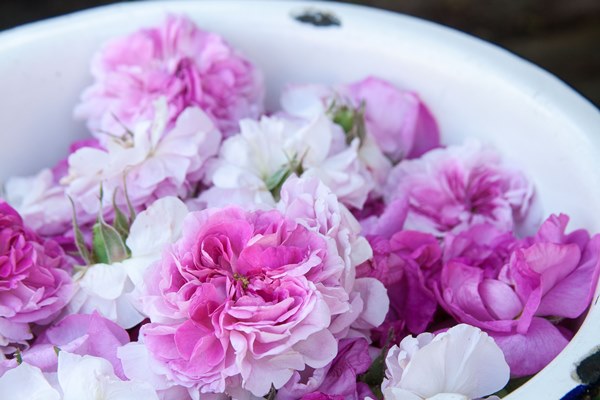
Even older than rose oil is rosewater, an ingredient with a history predating Avicenna. Lebanese food writer Barbara Abdeni Massaad, whose award winning cookbook Mouneh explores the traditions of preserving fruit, vegetables and flowers, includes a section on making rosewater. “Yes, the distillates from roses and orange flowers continue to be made in villages,” she commented on the vitality of the tradition. “Older people still believe that homemade is best.”
First, the rose petals are placed in the lower part of an alembic and covered by water. Then, the contraption is sealed with a paste of ashes and flour and cold water is added to the top of the alembic. Heated slowly, the rose petals give off their essential oil and the watery substance (hydrosol) that remains behind after the essence is removed has a rich scent. This is rosewater. It is used to flavor puddings, candies and savory dishes, and in the Middle East a flask of fragrant liquid is offered to guests to freshen up their hands and faces. More than a delicious aromatic, rosewater is also part of a culture and is believed to have medicinal properties.
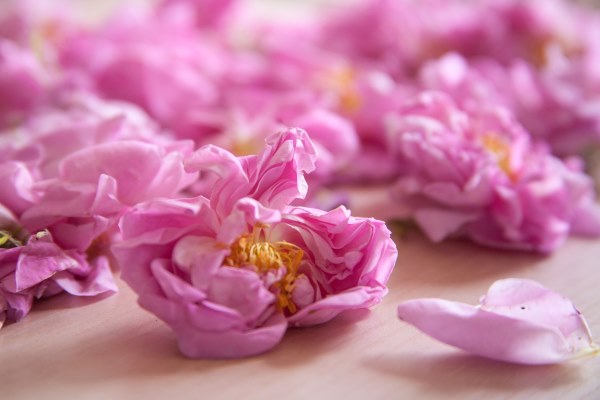
When I recently visited Givaudan, one of the leading fragrance and flavor companies, I noticed an ingredient called Rose Natsource® Extract. Some quick research revealed that to obtain it, rosewater is treated one more time to retain the volatile elements, which are then reconstituted into the novel product. In contrast to the heft and richness of essential oil, the rosewater extract smells citrusy and fruity. Avicenna doubtless would find this blend of old and new intriguing.
Givaudan is not the only one in on the act; International Flavors & Fragrances has a material called Rose Water Essential. And so as more companies use modern technology to recast traditional materials, rosewater extracts are finding their way into perfume formulas. They are also significantly less expensive than classical rose oils and absolutes, and even a small amount can add richness and curves—the French call it “gras”, fat—to a composition.
One illustration is Arquiste’s Fleur de Louis, which uses a touch of rosewater in its jasmine laced bouquet. Rose is just an accent in this plush blend of night blooming flowers, but its radiance lingers. Layered onto dark woods, the flowers have a baroque opulence, but even in the powdery drydown, they remain bright and clear.
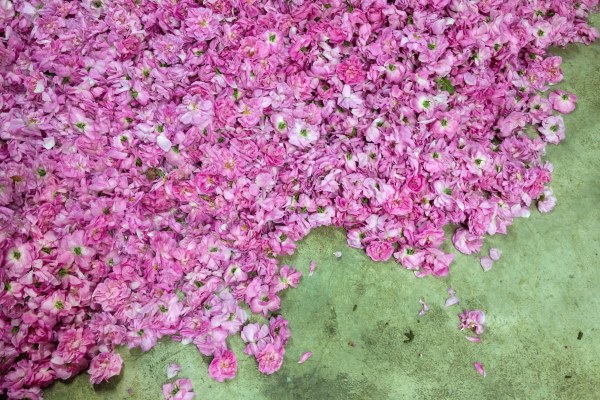
Other fragrances play with the idea of rosewater freshness by contrasting the floral notes with green, leafy accents. Perfumers may use the rosewater extracts in this context or create their own fantasy accords by combining materials that evoke the delicate aroma of rosewater. For instance, Histoires de Parfums’ Vert Pivoine and Cartier’s Eau de Cartier Goutte de Rose take rose into a crisp and cool direction. Eric Buterbaugh Florals’s Sultry Rose adds passion fruit and pepper, with the end result being more coquettish than smoldering, but nevertheless charming.
Massaad recommends adding a splash of rosewater to black coffee, and following her advice I have been enjoying many rose perfumed mornings. Since Avicenna prescribed rosewater to strengthen the heart, it feels like a perfect way to start the day.
Mouneh: Preserving Foods for the Lebanese Pantry by Barbara Abdeni Massaad, winner of the Gourmand Cookbook Award 2010 and Prix de la literature Gastronomique 2010.
Do you use rosewater? Do you have fresh rose scents?
Extra reading: 10 Ways to Use Rosewater
Photography by Bois de Jasmin



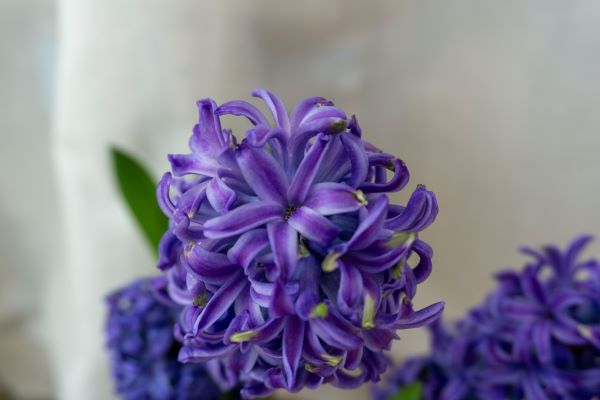
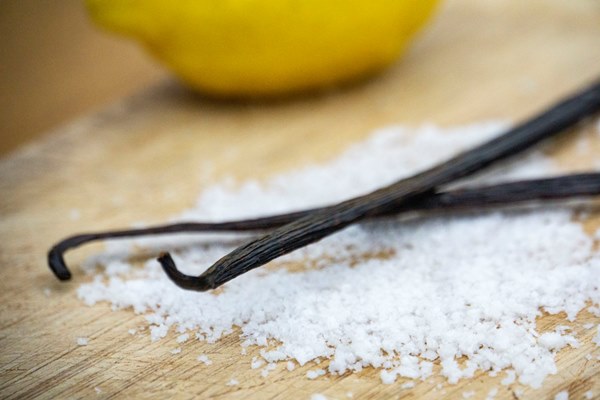
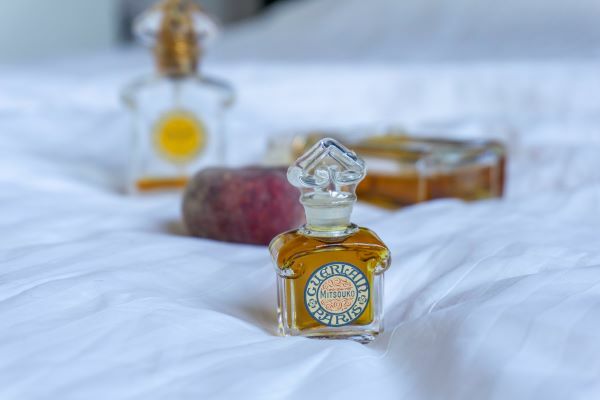








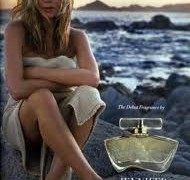
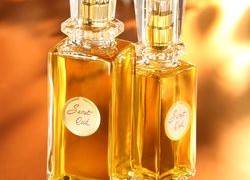

10 Comments
Donna: Mmmm. I distill roses, so there is always some to find its way into the kitchen! I use it with saffron in rice, or making coriander/rose cookies ( with handmade rose sugar), macaroons, sometimes with chicken.
Not a coffee drinker, but the idea of rose perfumed coffee sounds heavenly!
And have yet to find a chocolate flavored with a real rose extraction (not isolates).
Any recommendations? November 10, 2023 at 9:29am
Sandra: I love all things with a rose water fragrance. I have never thought of adding this to my coffee-but will give it a try!
Sometimes I add a little rose water to my plain yogurt
Now time to look in my perfume cabinet for nice rose fragrance November 10, 2023 at 9:52am
Dorothy: I wonder, would rosewater work in pannacotta? Lavender is fantastic. November 10, 2023 at 11:52am
Debi Sen Gupta: How do you use lavender in panna cotta? Sounds interesting. I have used orange blossom water in Panna cottas and other desserts – so rose water should work. December 5, 2023 at 2:35am
Aurora: Lovely article on a favorite ingredient. I use rosewater every morning after cleansing my face, and often during the day for a quick pic me up. My current bottle is from Lebanon but I’ve also used Iranian rosewater.
Recently I purchased rose syrup but I haven’t done anything with it yet. November 10, 2023 at 12:12pm
MaureenC: I put a splash of Rosewater in mint tea. I tried it in a Middle Eastern cafe and loved it. November 11, 2023 at 2:46am
Ewan: I went to meet a client at her office, it was her birthday. She’d been given a bunch of beautiful roses that had no smell whatsoever. She left the office so I added a drop of Bulgarian rose oil to the vase. When she returned she was a little confused and I told her what I had done. She happily played the game when people remarked on the heady scent of this particular bunch of roses. November 11, 2023 at 3:45am
Meredith Russell: Why do they even breed roses with no scent? Seems to defeat the purpose of having a rose? November 11, 2023 at 1:41pm
Ewan: The heavy accent on the visual in today’s world, perhaps. The Olfactory world is being sidestepped for ‘the look’. And they often have no thorns either! November 12, 2023 at 2:25am
Nancy Chan: I enjoy rose flavours in confectionery. My favourite is Prestat rose fondant creams enrobed in dark chocolate, the same goes for Violet. Mymoune makes a very nice rose jam, goes well with plain yoghurt. November 11, 2023 at 4:01pm